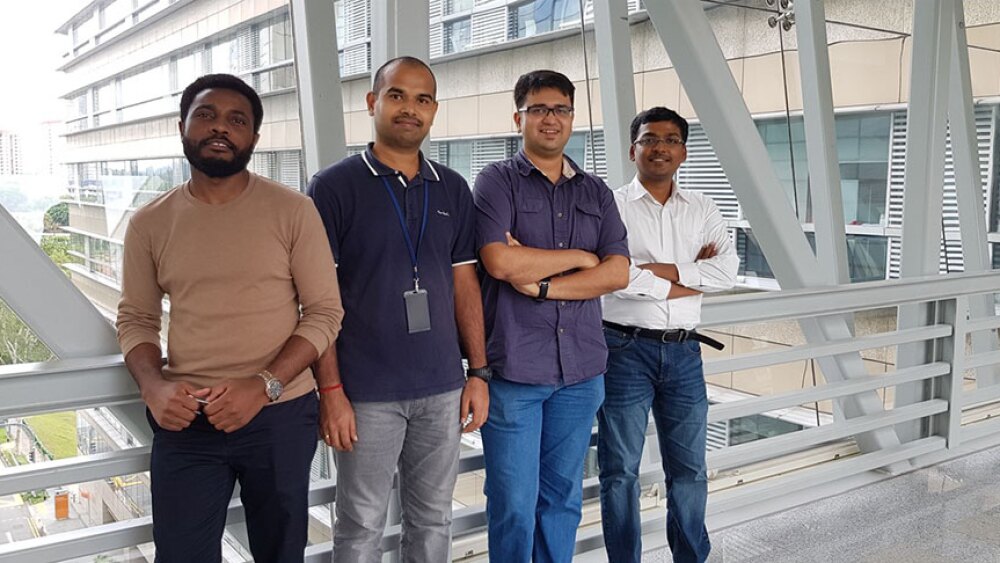Studies on a novel protein that helps cancer cells to grow and spread may help in the development of more efficient therapies for liver cancer
Studies on a novel protein that helps cancer cells to grow and spread may help in the development of more efficient therapies for liver cancer
Dr Sayan Chakraborty (pictured second from right) with his research team from IMCB.
Image credit: Sayan Chakraborty, Senior Research Fellow, Institute of Molecular and Cell Biology (IMCB), A*STAR
SINGAPORE, 26 SEPTEMBER 2019 – Scientists from A*STAR’s Institute of Molecular and Cell Biology (IMCB), in collaboration with researchers from Lee Kong Chian School of Medicine, Nanyang Technological University (NTU), have identified a protein, Agrin, which could be a novel target for developing therapies that can inhibit the growth and spread of liver cancer tumours.
This is an important discovery because the researchers demonstrated that Agrin acts as an ignition switch to fuel the formation of new blood vessels from pre-existing ones, also known as angiogenesis. This process plays a vital role in the development and spread of cancer cells to secondary organ sites such as the lungs. Agrin also facilitates migration of blood vessels within growing tumours, and provides stability to a key receptor on the cells lining the blood vessels during this process.
Using experimental models, the research team showed that the inhibition of Agrin reduced blood vessel infiltration and growth within tumours, thereby shrinking tumour size and progression. The research findings shed light on the mechanisms that regulate blood vessel formation and the treatment of diseases involving angiogenesis.
Liver cancer or Hepatocellular carcinoma (HCC) is highly prevalent in many Asian countries, and is one of the most common cancers among men in Singapore. Presently, HCC patients do not have many options apart from late stage therapies that only offer incremental benefits.
“The knowledge that Agrin may promote blood vessel formation to aggravate liver cancers will contribute to the development of appropriate therapies. By inhibiting Agrin, we can cut off blood supply to the cancer cells and stop tumour growth. The eventual goal is better health outcomes for patients,” said Dr Sayan Chakraborty, Senior Research Fellow in Prof Hong Wanjin’s group at A*STAR’s IMCB, and co-lead researcher of the study.
Moving forward, the research team plans to investigate how targeting Agrin prevents blood vessel formation in liver and other tumours, and whether Agrin’s role in angiogenesis can be exploited in other types of cancers. The team is collaborating with A*STAR’s Experimental Drug Development Centre (EDDC) and Singapore Immunology Network (SIgN) to devise Agrin-based therapies for HCC.
For more information, please refer to the paper “A Role of Agrin in Maintaining the Stability of Vascular Endothelial Growth Factor Receptor-2 during Tumor Angiogenesis”, published online by the journal Cell Reports.
Link to online version:
https://www.cell.com/cell-
###
About A*STAR’s Institute of Molecular and Cell Biology (IMCB)
The vision of Institute of Molecular and Cell Biology (IMCB) is to be a premier cell and molecular biology institute which addresses the mechanistic basis of human diseases and its mission is to conduct cutting-edge discovery research in disease pathways; to groom early career researchers to be future leaders in research; and to collaborate with medical and industry communities for research impact. IMCB plays an important role training and recruiting scientific talents, and has contributed to the development of other research entities in Singapore. Its success in fostering a biomedical research culture in Singapore has catalysed Singapore’s transformation into an international hub for biomedical research, development and innovation.
Funded by A*STAR, IMCB’s Discovery research comprises 5 major programmes: Cancer Cell Signalling, Multi-Modal Molecular (M3) Biology, Epigenetics and Diseases, iPS cell and Regenerative Medicine, and Technology and Translation. IMCB’s technologies and platforms focus on Genome-wide RNAi, Humanised Mouse Models, Proteomics and Protein Engineering, Gene Therapy and Gene Editing, and Molecular Histopathology.
For more information about IMCB, please visit www.imcb.a-star.edu.sg.
About the Agency for Science, Technology and Research (A*STAR)
The Agency for Science, Technology and Research (A*STAR) is Singapore’s lead public sector agency that spearheads economic oriented research to advance scientific discovery and develop innovative technology. Through open innovation, we collaborate with our partners in both the public and private sectors to benefit society.
As a Science and Technology Organisation, A*STAR bridges the gap between academia and industry. Our research creates economic growth and jobs for Singapore, and enhances lives by contributing to societal benefits such as improving outcomes in healthcare, urban living, and sustainability.
We play a key role in nurturing and developing a diversity of talent and leaders in our Agency and research entities, the wider research community and industry. A*STAR’s R&D activities span biomedical sciences and physical sciences and engineering, with research entities primarily located in Biopolis and Fusionopolis. For ongoing news, visit www.a-star.edu.sg.





